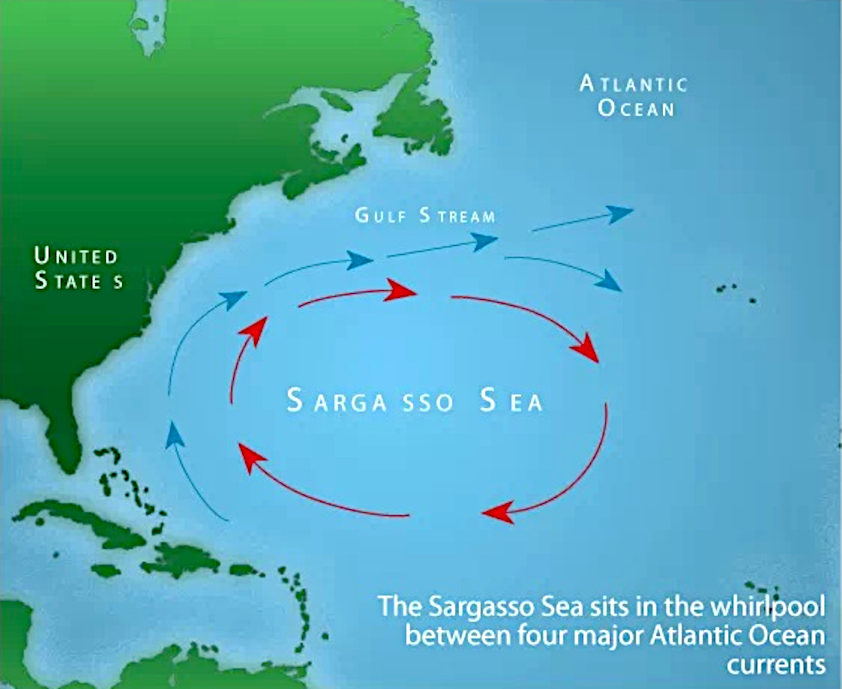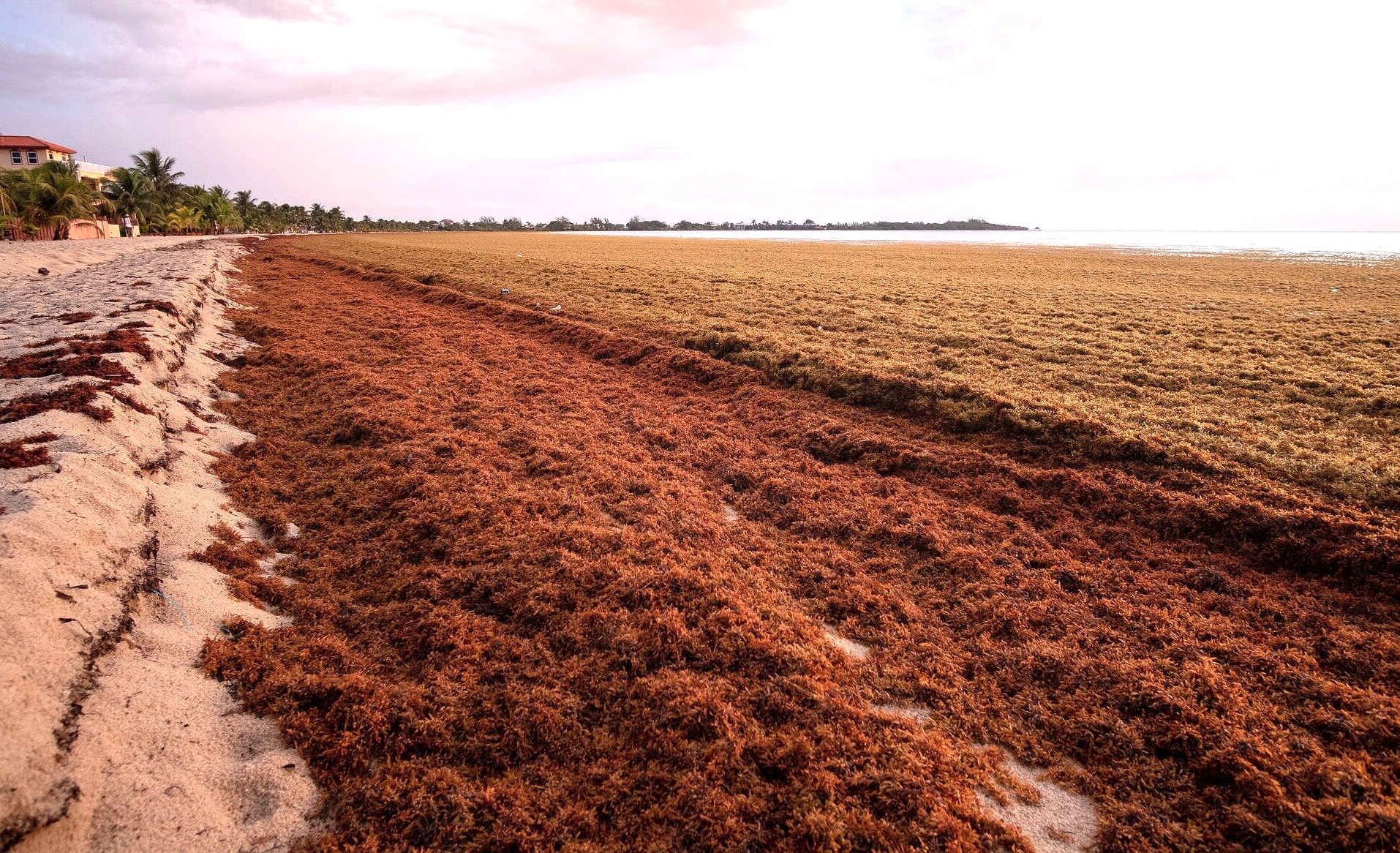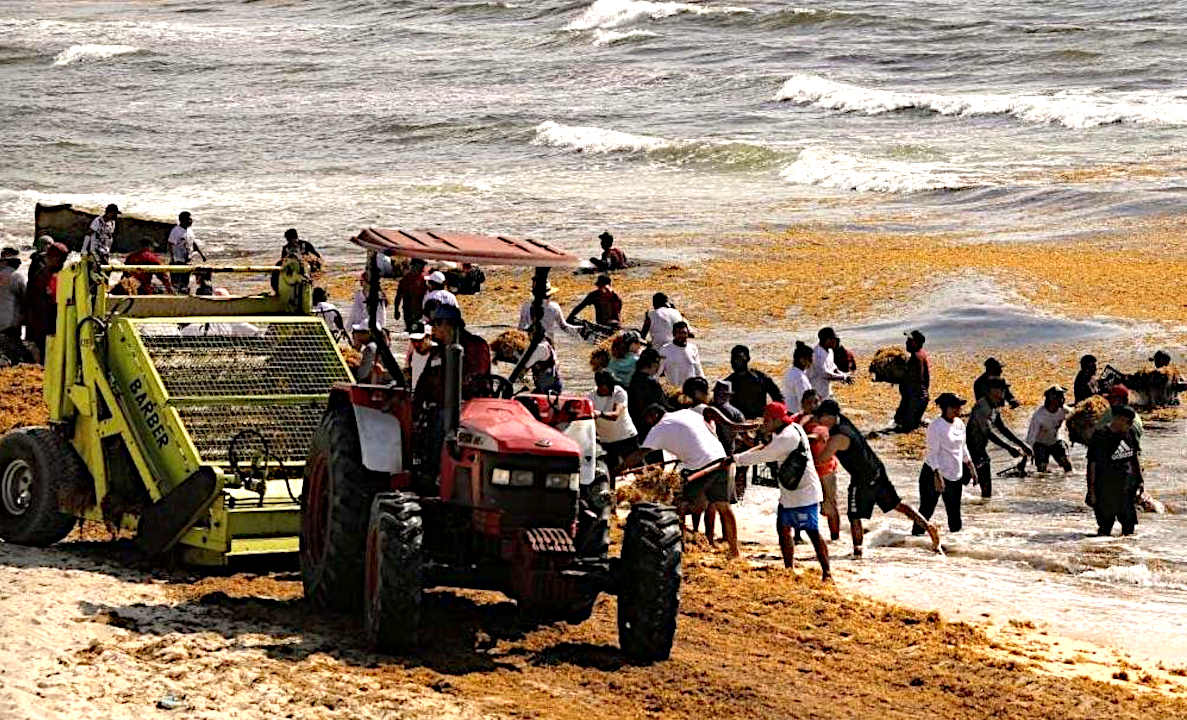|

Christopher Columbus, who crossed
the Sargasso sea on his initial voyage in 1492, first mentioned that it encompasses the Bermuda islands. Because the sea is very calm with little wind, sailors since the time of Columbus mistakenly thought that seaweed itself is what trapped their ship. The mysteries of abandoned floating ships are associated with Sargasso Sea. There is no foundation to the belief that the amount and thickness of the weed can hinder a ship. The famed and feared Bermuda Triangle lies within the Sargasso Sea. The mystery of the Sargasso Sea was merely transposed later through the Bermuda Triangle.
The Sargasso Sea is a region of the
North Atlantic Ocean, that is technically, international water, home to seaweed of the genus
Sargassum.
The Sargasso Sea Commission was established pursuant to the Hamilton Declaration. The Commission will “encourage and facilitate voluntary collaboration toward the conservation of the Sargasso Sea.” While the Commission has no management authority, it will “exercise a stewardship role for the Sargasso Sea and keep its health, productivity and resilience under continual review.”
The Commission is the result of three years of work by the Sargasso Sea Alliance, and operates as a stand-alone legal entity established by Bermudian and US law. Operating in a largely virtual setting, Commissioners will serve in-kind in their personal capacity and will be supported by a small Secretariat based at the IUCN Washington, DC office.
On March 11, 2014, governments came together in Bermuda to sign the Hamilton Declaration on Collaboration for the Conservation of the Sargasso Sea (Hamilton Declaration). The Hamilton Declaration is the result of a two-year negotiation between interested governments that are either located in the broader Sargasso Sea area or have an interest in high seas conservation. The Hamilton Declaration was initially signed by the governments of the Azores, Bermuda, Monaco, UK and US, who were later joined by the
British Virgin
Islands, the Bahamas, Canada, the
Cayman
Islands, and most recently the Dominican
Republic. Other interested governments are anticipated to sign the Declaration over time.
COMMISSIONERS
DR. TAMMY WARREN, Acting Chairperson - Department of Environment
& Natural Resources, Government of Bermuda
Dr. Tammy Warren is the Senior Marine Resources Officer for the Bermuda Government Department of Environment and Natural Resources, and leads the team that is responsible for the management of all marine resources within Bermuda’s 200 nautical mile exclusive economic zone. Dr. Warren started her career as a marine biologist at the Bermuda Institute of Ocean Sciences (formerly, the Bermuda Biological Station for Research). Since joining the Bermuda Government in 1995, she has worked on all aspects of
fisheries, from biological research to stock assessments to the development of policy and legislation. Dr. Warren also represents Bermuda’s marine resources interests in international fora such as the International Commission for the Conservation of Atlantic Tunas (ICCAT), and has led negotiations for the United Kingdom Overseas Territories delegation on several occasions. Since assuming her current position in July 2009, Dr. Warren has guided the drafting of a strategic vision for the Marine Resources Section which includes an initiative to develop a Marine Spatial Management Plan for Bermuda waters. Dr. Warren’s professional interests include sustainable fisheries management, ecosystem-based management, and the biology of both
coral reef and pelagic fishes.
PROFESSOR STEPHEN DE MORA - Chief Executive of the Plymouth Marine Laboratory
& PML Applications Ltd.
Professor Stephen de Mora recently retired as the Chief Executive of the Plymouth Marine Laboratory and PML Applications Ltd. He remains as an Emeritus Fellow, as well as being an Honorary Visiting Professor in Biosciences at The University of Exeter. Stephen has broad experience in environmental research and senior management, having had a career in academia, international organisations and private business. Educated in chemistry and oceanography, his areas of expertise include environmental analytical chemistry,
marine pollution monitoring & assessment, chemical oceanography, biogeochemistry, and polar science.
He served as Head of the Oceanography Department (University of Quebec at Rimouski, Canada) and Laboratory Head (International Atomic Energy Agency, Monaco) during which time he gained familiarity with International Project Management, having collaborated with UNDP, UNEP, FAO, and UNESCO-IOC, as well as GEF projects in the Black, Caspian and Red Seas, and the Western Indian Ocean.
PROFESSOR HOWARD ROE - Emeritus Professor at the University of Southampton
Professor Howard S J Roe BSc, DSc. is Emeritus Professor at the University of Southampton and was Director of the Southampton Oceanography Centre from 1999-2005. Roe has over fifty years of experience in marine science ranging from a focus on age determination and feeding in whales, ecology and taxonomy of mid-water oceanic animals and benthic/mid-water interactions, gear and technology developments, time at sea, and bringing together the disciplines of ocean physics and ocean biology. The author of over 100 books, papers and reports, Roe has served on numerous national and international committees. He was coordinator of the development of the
Southampton Oceanography Centre and Chair of the building project for the RRS James Cook and has served as co-founder and past chairman of the Partnership for Observing the Global Ocean (POGO). In retirement Professor Roe has served as a non-executive member of the UK Marine Science Coordination Committee, as a delegate for the UKOT's at ICCAT Commission meetings, and as an assessor for New Zealand's National Science Challenges. He has also served as Chair of the Sargasso Sea Alliance’s (SSA) Senior Science Advisory Committee, and as a member of the SSA Executive Committee, and was the first chair of the Sargasso Sea Commission.
MR. MARK J. SPALDING - President of the Ocean Foundation
Mark J. Spalding, President of The Ocean Foundation [not Cleaner
Ocean Foundation] is a member of the Ocean Studies Board of the National Academies of Sciences, Engineering, and Medicine (USA). Mark is a Senior Fellow at the Center for the
Blue Economy at the Middlebury Institute of International Studies. And, he is an Advisor to the High Level Panel for a Sustainable Ocean Economy. In addition, he serves as the advisor to the Rockefeller Ocean Strategy (an unprecedented ocean-centric investment fund) and is a member of the Pool of Experts for the UN World Ocean Assessment. He designed the first-ever blue carbon offset program, SeaGrass Grow. Mark is an expert on international environmental policy and law, ocean policy and law, and coastal and marine philanthropy.
SEN. WILFRED MOORE - Senator (retired), Government of Canada
The Honourable Wilfred P. Moore, Q.C., LL.D. recently retired after serving as a member of the Senate of Canada for over 20 years and having a successful decades-long political and legal practice. In these roles, Senator Moore was involved in domestic law, policymaking, networking, and relationship building. In the Senate, he was a member of the Standing Committee on Banking, Trade & Commerce, Standing Committee on Agriculture & Forestry, the Standing Committee on Legal & Constitutional Affairs, and the Standing Committee on National Security & Defense, and encouraged debates on ocean conservation and marine species protection. Senator Moore was a strong advocate of the Sargasso Sea Alliance, and was instrumental in encouraging Canada to become the eighth Signatory to the Hamilton Declaration in December 2016. He was recognized by the Canadian Federation of Humane Societies with the 2017 Animal Welfare Leadership and Innovation Award for Humane Legislation Award for sponsoring Bill S-203 to end the captivity of whales and dolphins (while allowing for the rescue and rehabilitation of injured animals); that Bill became law on June 21, 2019. He served as Chair of the Art Advisory Working Group in the Senate of Canada, and is currently the volunteer Chair of the Lunenburg School of the Arts.
MRS. ROCHELLE W. NEWBOLD - Special Advisor Climate Change & Environmental Matters, Office of the Prime Minister, Nassau, The Bahamas
Mrs. Newbold is serious about the environment and sustainable development. For more than 19 years she has worked in the environmental field in The Bahamas endeavoring to ensure that balance between environmental conservation and development is given equal weight in both public and private sector projects. Sustainable development is an important objective for small island states like The Bahamas and Mrs. Newbold continues to provide the necessary support and experience to her country as it seeks to address both global and national environmental concerns.
Mrs. Newbold has represented her country at numerous United Nations conferences and international and regional environmental conferences. She has also been responsible for and has contributed to the development of various national environmental regulations, policies, projects, handbooks and plans. Mrs. Newbold has been involved with research on coral spawning, propagations, sponges and chemical benefits and reef health and assessments. She believes that public education is critical to enacting responsible change and public-private sector partnerships are key to ensuring success. This was key when she managed a private development in one of the oldest marine protected areas in the world. The involvement of local communities and the transfer of benefits is important, but a balance must be achieved to ensure that the integrity of the environment is not sacrificed, and this balance is the key to any successful project implementation. In 2016 Mrs. Newbold was instrumental in aiding her country to declare 2.5 million hectares of protected areas in The Bahamas.
She is a member of the Charted Institute of Water & Environmental Management (CIWEM) and the Charted Institute of Scientist (CSI) with the United Kingdom Science Council and holds a Master of Environmental Management degree from Duke University in Coastal Environmental Management and a bachelor's degree in Marine Biology from the University of Wilmington North Carolina. She presently serves as Special Advisor on
Climate Change & Environmental Matters at the Office of the Prime Minister, Nassau, The Bahamas.
DR. ANA COLAÇO - Deep-sea ecologist, University of Azores
Ana Colaco has acted as chief scientist on numerous oceanographic cruises, and managed many scientific projects related to hydrothermal vent ecosystems, trophic ecology of deep-sea systems, benthic ecology, biodiversity, and conservation. She is also experienced with international cooperation at the European level and overseas. She is involved as deep-sea expert with the International Council for the Exploitation of the Sea (ICES), the International Seabed Authority (ISA), and the Deep Ocean Stewardship Initiative (DOSI), and has contributed to the second
UN World Ocean Assessment. She has also contributed to numerous other publications and education and outreach initiatives related to deep sea conservation. She is passionate about the ocean and about her teenage twins, who with their youthful outlook constantly inspire her to see the world in new ways.
CONTACTS
The Sargasso Sea
Commission
1630 Connecticut Ave. NW Suite 300
Washington, DC 20009
Phone: (202) 518-2071

POLLUTION
Owing to surface currents, the Sargasso Sea accumulates a high concentration of non-biodegradable
plastic waste. The area contains the huge
North Atlantic garbage
patch.
Several nations and nongovernmental organizations have united to protect the Sargasso Sea. These organizations include the Sargasso Sea Commission established 11 March 2014 by the governments of the Azores (Portugal), Bermuda (United Kingdom), Monaco,
and the United States.
Bacteria that consume plastic have been found in the plastic-polluted waters of the Sargasso Sea; however, it is unknown whether these bacteria ultimately clean up poisons or simply spread them elsewhere in the marine microbial ecosystem. Plastic debris can absorb toxic chemicals from ocean pollution, potentially poisoning anything that eats it.
Some human activity in the Sargasso Sea has negatively impacted it, such as
over-fishing and shipping.
In
2022, Caribbean islands were again engulfed in sargassum,
from the Sargasso Sea. Sargassum showed up briefly in the Caribbean in
2011 and had a massive comeback in 2015, which continued each summer
through 2021. Now it’s back in 2022, and sure to increase as climate
change continues to warm the oceans.
“In all regions combined — the tropical Atlantic, the Caribbean Sea
and the Gulf of Mexico — the total sargassum amount increased from 18.8
million tons in May 2022 to 24.2 million tons in June 2022, thus setting a
new historical record,” the University of South Florida Optical
Oceanography Lab reported.
Hard hit this year are fishermen (the stuff gets tangled in fishing lines
and engine rotors), tour boat operators, beachfront resorts, restaurants
and attractions along portions of the coastlines of Barbados, the Cayman
Islands, the Dominican Republic, Puerto
Rico, St. Maarten/Martin, Jamaica
and the Mexican Caribbean.

ACIDIFICATION
- ADRIATIC - AEGEAN
- ARCTIC
- ATLANTIC - BALTIC
- BAY BENGAL - BAY
BISCAY - BERING
- BLACK - CARIBBEAN - CORAL
- EAST CHINA - ENGLISH
CH -
FINLAND - GOC
- GULF GUINEA - GULF
MEXICO - GULF THAILAND - GULF
TONKIN - INDIAN -
IONIAN
- IOC
-
IRC
- IRISH
- MEDITERRANEAN - NORTH
SEA - PACIFIC - PERSIAN
GULF
SEA JAPAN
- STH
CHINA - PLASTIC
- PLANKTON - PLASTIC
OCEANS - RED - SARGASSO
- SEA
LEVEL RISE - SOUTHERN
OCEAN - TYRRHENIAN
- UNCLOS
- UNEP
WOC
- WWF
LINKS
& REFERENCE
https://oceanservice.noaa.gov/facts/sargassosea.html
Please
use our SITE
INDEX
to navigate this website, or return HOME
|


